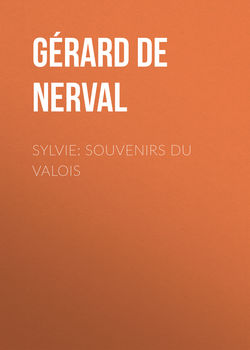Читать книгу Sylvie: souvenirs du Valois - Gérard de Nerval - Страница 3
GÉRARD DE NERVAL
ОглавлениеIl a toujours cherché dans le monde ce que le monde ne pouvait plus lui donner.
LUDOVIC HALÉVY.
He has been a sick man all his life. He was always a seeker after something in the world that is there in no satisfying measure, or not at all.
WALTER PATER.
I
Of Gérard de Nerval, whose true name was Gérard Labrunie, it has been finely said: "His was the most beautiful of all the lost souls of the French Romance."1 Born in 1808, he came to his death by suicide one dark winter night towards the end of January.
The story of this life and its tragic finale was well known at the time to all men of letters, – Théophile Gautier, Paul de Saint-Victor, Arsène Houssaye, – friends who never forgot the young poet even after he went the way that madness lies. For it was insanity, – a nostalgia of the soul always imminent – that led him into the squalid Rue de la Vieille-Lanterne, in which long forgotten corner of old Paris his dead body was found one bleak belated dawn. And this was forty years ago.
In later days Maxime du Camp and Ludovic Halévy have retold with great feeling the history of Gérard, his early triumphs, his love for Jenny Colon, – the Aurélie of these Souvenirs du Valois, – and how at last life's scurrile play was ended.
II
One of Mr. Andrew Lang's most genuine appreciations occurs in an epistle addressed to Miss Girton, Cambridge; where, for the benefit of that mythical young person, he translates a few passages out of Sylvie, and favours us with a specimen of Gérard's verse.
"I translated these fragments," he tells her, "long ago in one of the first things I ever tried to write. The passages are as touching and fresh, the originals, I mean, as when first I read them, and one hears the voice of Sylvie singing:
'A Dammartin, l'y a trois belles filles,
L'y en a z'une plus belle que le jour.'
So Sylvie married a confectioner, and, like Marion in the 'Ballad of Forty Years,' 'Adrienne's dead' in a convent. That is all the story, all the idyl."
And just before this he has said of Gérard: "What he will live by, is his story of Sylvie; it is one of the little masterpieces of the world. It has a Greek perfection. One reads it, and however old one is, youth comes back, and April, and a thousand pleasant sounds of birds in hedges, of wind in the boughs, of brooks trotting merrily under the rustic bridges. And this fresh nature is peopled by girls eternally young, natural, gay, or pensive, standing with eager feet on the threshold of their life, innocent, expectant, with the old ballads of old France upon their lips. For the story is full of these artless, lisping numbers of the popular French muse, the ancient ballads that Gérard collected and put into the mouth of Sylvie, the pretty peasant-girl."
One more quotation from Mr. Lang, and we are done. Sylvie and Gérard have met, and they go on a visit to her aunt, who, while she prepares dinner, sends Gérard for her niece, who had "gone to ransack the peasant treasures in the garret." "Two portraits were hanging there – one, that of a young man of the good old times, smiling with red lips and brown eyes, a pastel in an oval frame. Another medallion held the portrait of his wife, gay, piquante, in a bodice with ribbons fluttering, and with a bird perched on her finger. It was the old aunt in her youth, and further search discovered her ancient festal-gown, of stiff brocade, Sylvie arrayed herself in this splendour; patches were found in a box of tarnished gold, a fan, a necklace of amber."
This is the charming moment chosen by M. Andhré des Gachons as the subject of his aquarelle, reproduced in colour as frontispiece to the present edition.
III
In thus bringing out a fresh version of Sylvie, not to include the all too few illusive lyrics "done into English" by Mr. Lang, his exquisite sonnet on Gérard, and the lovely lines upon "Sylvie et Aurélie," were a deplorable omission. The sonnet exists in an earlier form; preferably, the later version is here given.
Of De Nerval's prose little has yet found its way to us. His poetry is fully as inaccessible. Things of such iridescent hue are possibly beyond the art of translation. They are written in an unknown tongue; say, rather, in the language of Dreamland, "vaporous, unaccountable"; – a world of crepuscular dawns, as of light irradiated from submerged sea caverns, – "the mermaid's haunt" beheld of him alone.
IV
With what adieux shall we now take leave of our little pearl of a story? And of him who gave us this exquisite creation of heart and brain what words remain to say?
Thou, Sylvie, art an unfading flower of virginal, soft Spring, and faint, elusive skies. For thee Earth's old sweet nights have shed their tenderest dews, and in thy lovely Valois land thou canst not fade or die.
Thy lover, child, fared forth beneath an alien star. For him there was no true country, here; – no return to thy happy-hearted love: the desert sands long since effaced the valley track. Only the far distant lying, – the abyss that calls and is never dumb, urged his onward steps. And these things, and this divine homesickness led him, pale nympholept, beyond Earth's human shores. Thither to thee, rapt Soul, shall all bright dreams of day, all lonely visions of the night, converge at last.
1
See A Century of French Verse, translated and edited by William John Robertson (4to, London, 1895).
